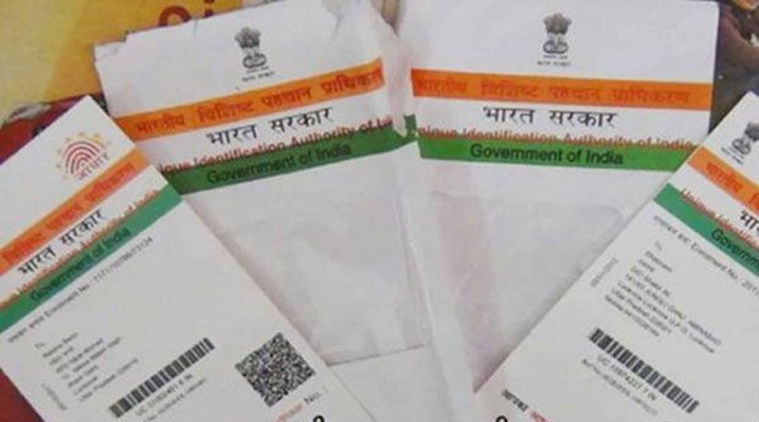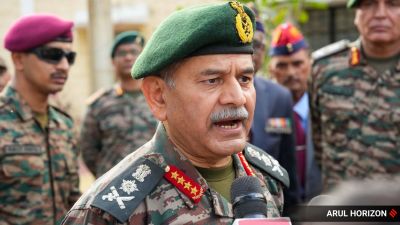Taking up for hearing a clutch of petitions challenging the Aadhaar Act, a five-judge Constitution Bench of the Supreme Court Wednesday asked the petitioners if the State was not entitled to collect biometric data of citizens to ensure that constitutional obligations are carried out.
“Can’t the State have a countervailing interest? For instance, there are many schools without students… They (State) may say all we are trying to do is to ensure that money is going where it ought to… If you are depending on social welfare benefits, equally the State has countervailing interests to ensure that they reach the right people,” Justice D Y Chandrachud, one of the five judges on the Bench, said.

Headed by Chief Justice of India Dipak Misra, the Bench also includes Justices A K Sikri, A M Khanwilkar and Ashok Bhushan.
Story continues below this ad
Senior Advocate Shyam Divan, who appeared for the petitioners, replied that such savings, they had found, were minimal. He said even if there were such savings, such an architecture was not possible. The unique identity architecture, he said, was such that “throughout the day, there will be an electronic trail of your movements and it is left with the central government… why should central government know my movements”.
“My movements can be tracked. With sophisticated computers, it can be tracked real time. Such an architecture is not permissible and is unconstitutional… This becomes a surveillance society.” Divan said biometrics across the world do not operate on this scale at all. “If someone hacks or hacks my fingerprints, no way I can replace them.”
Aadhaar, he said, was helping the State profile citizens and had “empowered” it with “a switch with which it can cause civil death of an individual”. It raised several questions including “whether the Constitution of India authorises creation of a surveillance state and whether the vulnerability of the database threatened national security”.
“There ought to be an opt-out option according to us since there are many who say there was no consent at all… there was no counselling (while enrolling),” Divan said.
Story continues below this ad
After enrolling for Aadhaar, a person is required to authenticate his or her biometrics to avail benefits. But the algorithm followed by the unique identity is “probabilistic” which means that authentication may or may not happen, Divan said, adding that this will have the effect of making the subscriber’s entitlement wholly dependent on the authentication. “This leads to excluding people from services. How can anyone’s right be made probabilistic?” he submitted.
CJI Misra echoed Justice Chandrachud when he said, “Article 21 confers fundamental rights which include the right to education. To ensure that, they (State) must ensure that teachers and students come to school. They may say their purpose is this.” He also referred to fingerprint collection at entry gates of offices etc. Divan said that the petitioners had no problem with biometrics being required at entry gates etc. “Our objection is to a central registry which stores the data. Then you know exactly, from cradle to grave, what a person is doing,” he said.
Justice Sikri referred to the US embassy seeking biometrics to process visa applications and at border controls. Divan said this was different from Aadhaar as in the case of US border control, the requirement of biometrics ends there, unlike Aadhaar where the electronic trail happens throughout. “Aadhaar acts as bridge between silos of information and helps profiling,” Divan said. He said there was no government control at all when data was being collected from 2014.
At this, Justice Chandrachud asked: “Is your contention going to be: all data prior to 2014 has no legal standing at all?” Justice Sikri said: “Are you saying that whatever was done between 2009 and 2016 needs to be nullified?” Divan replied in the affirmative, adding “when you are picking sensitive data from people, there has to be some minimum governance… Defects of the past cannot be cured retrospectively.”
Story continues below this ad
When Divan invoked the Supreme Court judgment on the right to privacy to buttress his arguments, Justice Chandrachud said: “There are two separate cases. Firstly, what we dealt with in the privacy judgment. Secondly, will your biometric data, which is held in the central depository, be disclosed when you authenticate? It only authenticates, it does not send back the biometric data.”
Raising their challenge, the petitioners also questioned the manner in which such an important legislation was introduced as a money Bill. Divan said the law must fall for this reason alone, adding “it is a colourable legislation”. The arguments will continue Thursday.

 After enrolling for Aadhaar, a person is required to authenticate his or her biometrics to avail benefits. (Representational purpose)
After enrolling for Aadhaar, a person is required to authenticate his or her biometrics to avail benefits. (Representational purpose)






